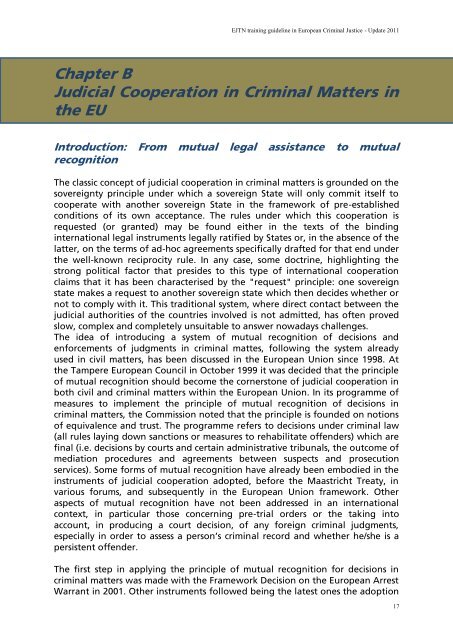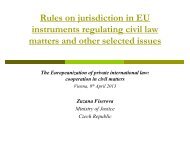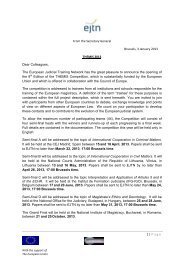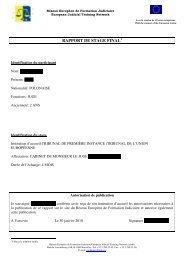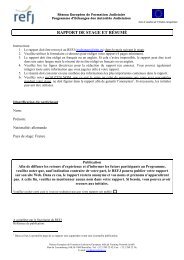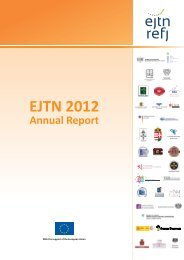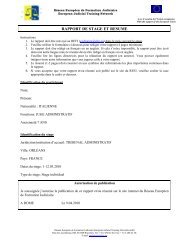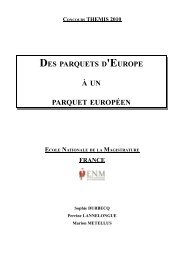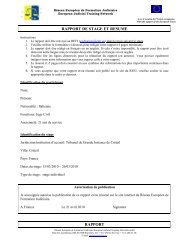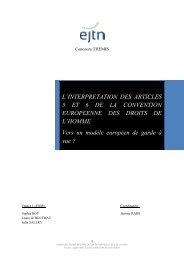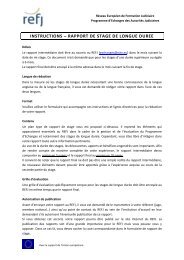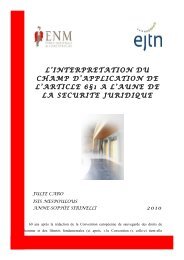European Criminal Justice - EJTN
European Criminal Justice - EJTN
European Criminal Justice - EJTN
- No tags were found...
You also want an ePaper? Increase the reach of your titles
YUMPU automatically turns print PDFs into web optimized ePapers that Google loves.
<strong>EJTN</strong> training guideline in <strong>European</strong> <strong>Criminal</strong> <strong>Justice</strong> - Update 2011Chapter BJudicial Cooperation in <strong>Criminal</strong> Matters inthe EUIntroduction: From mutual legal assistance to mutualrecognitionThe classic concept of judicial cooperation in criminal matters is grounded on thesovereignty principle under which a sovereign State will only commit itself tocooperate with another sovereign State in the framework of pre-establishedconditions of its own acceptance. The rules under which this cooperation isrequested (or granted) may be found either in the texts of the bindinginternational legal instruments legally ratified by States or, in the absence of thelatter, on the terms of ad-hoc agreements specifically drafted for that end underthe well-known reciprocity rule. In any case, some doctrine, highlighting thestrong political factor that presides to this type of international cooperationclaims that it has been characterised by the "request" principle: one sovereignstate makes a request to another sovereign state which then decides whether ornot to comply with it. This traditional system, where direct contact between thejudicial authorities of the countries involved is not admitted, has often provedslow, complex and completely unsuitable to answer nowadays challenges.The idea of introducing a system of mutual recognition of decisions andenforcements of judgments in criminal mattes, following the system alreadyused in civil matters, has been discussed in the <strong>European</strong> Union since 1998. Atthe Tampere <strong>European</strong> Council in October 1999 it was decided that the principleof mutual recognition should become the cornerstone of judicial cooperation inboth civil and criminal matters within the <strong>European</strong> Union. In its programme ofmeasures to implement the principle of mutual recognition of decisions incriminal matters, the Commission noted that the principle is founded on notionsof equivalence and trust. The programme refers to decisions under criminal law(all rules laying down sanctions or measures to rehabilitate offenders) which arefinal (i.e. decisions by courts and certain administrative tribunals, the outcome ofmediation procedures and agreements between suspects and prosecutionservices). Some forms of mutual recognition have already been embodied in theinstruments of judicial cooperation adopted, before the Maastricht Treaty, invarious forums, and subsequently in the <strong>European</strong> Union framework. Otheraspects of mutual recognition have not been addressed in an internationalcontext, in particular those concerning pre-trial orders or the taking intoaccount, in producing a court decision, of any foreign criminal judgments,especially in order to assess a person’s criminal record and whether he/she is apersistent offender.The first step in applying the principle of mutual recognition for decisions incriminal matters was made with the Framework Decision on the <strong>European</strong> ArrestWarrant in 2001. Other instruments followed being the latest ones the adoption17


